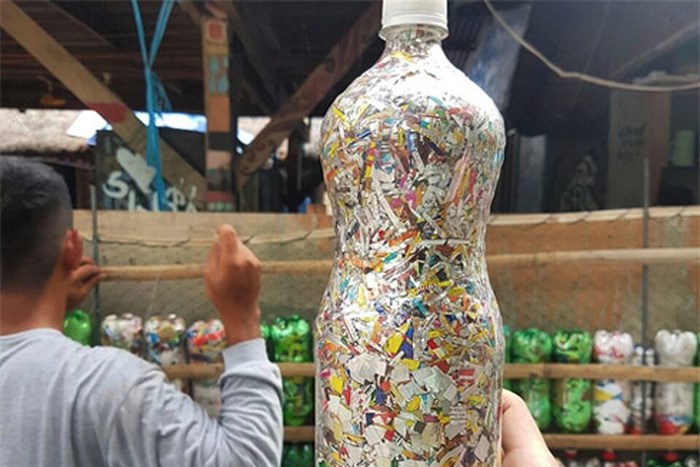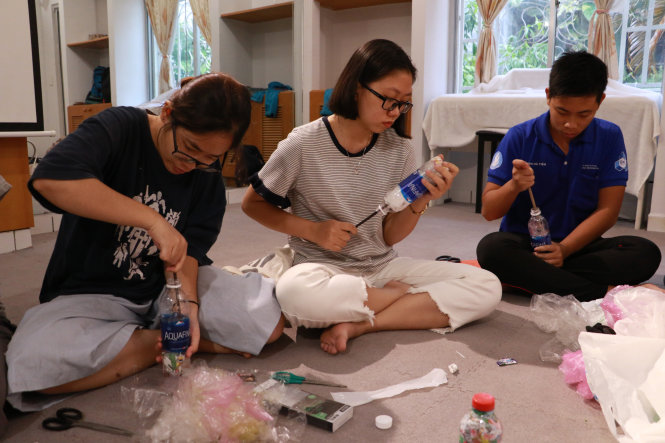Recently many environmentally conscious products such as metal straws, bamboo toothbrushes, wooden spoons, and cloth sanitary pads have attracted the attention of Vietnamese youngsters.
All the products mentioned above are made of safe, environment-friendly materials, and are reusable, which considerably reduces the amount of waste dumped into the environment.
Pioneers
A group of 30 youngsters were seated at the Cai To Nho (Little Nest) educational facility on Nguyen Dinh Chieu Street, District 1, Ho Chi Minh City to contribute to saving the environment and encouraging a clean lifestyle by turning unrecyclable waste into “ecobricks.”
Tran Anh Tuan, an active environmentalist, gathered the youngsters and instructed them to make the bricks.
The youngsters were each holding a plastic non-reusable water bottle and using chopsticks to fill it with unrecyclable materials including plastic bags, sponge wraps, and non-reusable raincoats, among others.
These ecobricks are used to build chairs, tables, walls or fences.
Soft plastic wastes like plastic bags are cut into long strips and placed at the bottom of the plastic bottle so as to guarantee the toughness of the brick.
Hard materials like sponge wraps are put in the middle or upper part of the bottle.
In this order, the materials are stuffed inside the bottle until it is full and has reached certain hardness.
With the help of various adhesives such as silicon, rubber, or rope, consumers can use these bottles to build what they need.
The idea was not Tuan’s original, he admitted.
It was first introduced in the Philippines around 10 years ago when the country was challenged by an incredible amount of trash.
A Filipino teacher came up with the idea to reuse the wastes from disposable products such as plastic cups, straws, and bags to make tables and chairs for students, Tuan said.
“Nowadays, over 1,700 schools in the Philippines encourage students to spend time making ecobricks,” the man said.
 |
| A close-up of an ecobrick made of unrecyclable waste pressed into a plastic water bottle. Photo: An Ninh Thu Do |
“This phenomenon has also spread to other countries with an increasing amount of waste such as Thailand, Indonesia, and Vietnam.”
Some schools in Ho Chi Minh City are also planning on taking action to encourage students to participate in this activity.
Another active young environmentalist would be Dang An, administrator and founder of the “Sap hang chang Sen” (Sen’s Stall) Facebook page, where he sells environment-friendly products in Hanoi.
Being very sensitive to chemicals, he started thinking about introducing several environment-friendly, chemical-free products that are safe for human health like water bottles made of haystack, metallic straws, and beeswax to cover food.
An’s Facebook page also promotes healthy lifestyles by sharing the bad impacts of plastic, waste-sorting instructions, and how to reduce the amount of plastic consumed on a daily basis, among others.
A conscious Vietnam
Green lifestyle is becoming increasingly familiar to youngsters as many have gotten used to bringing their own metallic bottles and cups to replace plastic non-reusable ones, as well as metallic or wooden straws in place of the disposable.
In response to this positive change, many stores specializing in environment-friendly products have started selling more customized items such as straws with the owner’s name, spoons with cute designs, or bottles decorated by professional artists.
Vo Huynh Tra Giang, a junior at Foreign Trade University in Ho Chi Minh City, an ecobrick workshop participant, uses bamboo straws, cloth bags for grocery shopping, and search tool Ecosia which contributes 80 percent of its profit to growing trees all over the world.
As of June 2018, there were over 30 million trees grown thanks to Ecosia’s fund.
Many young environmentalists have received a positive response from their acquaintances after encouraging green life and usage of many environment-friendly products.
Nguyen Dinh Uy, a 25-year-old man conscious of the environment, said, “There were very few people knowing about bamboo straws or cloth bags for shopping, but nowadays they are very open about this matter.
“I strongly believe that over time, a lot of Vietnamese will get used to living green.”
Like us on Facebook or follow us on Twitter to get the latest news about Vietnam!






















































